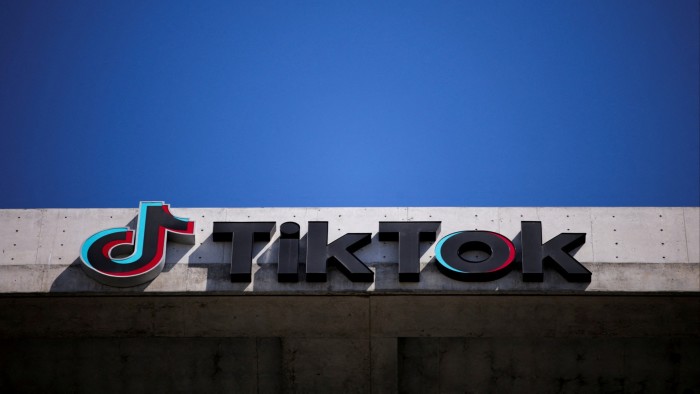One global trade war to start: Donald Trump detailed new restrictions targeting America’s trading partners on Wednesday. The US will impose so-called reciprocal tariffs on China of 34 per cent, hit the EU with a levy of 20 per cent and impose a universal 10 per cent tariff on all countries — including the UK.
Welcome to Due Diligence, your briefing on dealmaking, private equity and corporate finance. This article is an on-site version of the newsletter. Premium subscribers can sign up here to get the newsletter delivered every Tuesday to Friday. Standard subscribers can upgrade to Premium here, or explore all FT newsletters. Get in touch with us anytime: Due.Diligence@ft.com
In today’s newsletter:
-
TikTok’s US business nears its Trump deal
-
Private equity’s UK carried interest problem
-
Jardines, a Hong Kong financial empire, pivots
Wall Street heavyweights circle TikTok
One of Donald Trump’s first directives when he moved back into the White House in January was to bring the social media app TikTok back online after it went dark for 14 hours.
The concern at the time — and to this day — is that TikTok’s ties to its Beijing-based owner ByteDance posed national security concerns. While Trump boasted that the app had helped him win the election, it was nonetheless given an ultimatum: sell the US business, or shut it down.
Now comes the crucible. TikTok has until April 5, this Saturday, to entice a buyer. A who’s who of powerhouse Wall Street and Big Tech bidders have surfaced.
The FT scooped on Wednesday that a consortium of big private capital investors are in pole position to buy into the viral video app, which has more than 170mn US users.
A group of new outside investors, including Andreessen Horowitz, Blackstone and Silver Lake, would buy about half of TikTok’s US business in a planned carve-out.
Meanwhile, big existing investors such as General Atlantic, Susquehanna, KKR and Coatue would shift their stakes into the US business. Their investments would make up about 30 per cent of the business.
Just under 20 per cent of the company would still be owned by ByteDance, in order to meet the US legislation requirements that prohibit more than a fifth being in the control of a “foreign adversary”.
The potential transaction also includes Larry Ellison’s cloud software group Oracle, which would take on TikTok’s US data as part of a deal. The plans are preliminary and will require months of structuring and diligence.
Such a deal would be a coup for Andreessen, co-founded by Marc Andreessen, a vocal Trump acolyte on the 2024 campaign trail.
The firm, an early Facebook backer, had been one of the larger venture investors to miss out on ByteDance’s stratospheric rise, after it obliged to a silent rule in Silicon Valley to not back both sides of tech rivalries.
Trump officials were set to meet on Wednesday to discuss the negotiations and while the Wall Street consortium is in the lead, rival efforts from Amazon founder Jeff Bezos and others pose a threat.
Many dealmakers were holding their breath and the White House told the FT that Trump was the ultimate arbiter.
Private equity fumes over ‘extraterritorial tail’ of UK carried interest tax
In the lead-up to last October’s UK Budget, the term “carried interest” punched its way past the world of high finance for likely the first time.
Such was the speculation around how chancellor Rachel Reeves might close the private equity industry’s favoured tax “loophole”, that the debate seeped into the consciousness of those outside the realm of Mayfair’s hallowed buyout houses.
The Labour government eventually announced that from 2026 it would start treating dealmakers’ shares of profits as income, instead of capital gains.
But the rates would still be preferential, with most recipients in effect paying 34.1 per cent instead of the top income tax rate of 47 per cent including national insurance.
Many saw the proposal as a climbdown. The industry’s well-resourced lobbying campaign appeared to have won. Things went quiet.
But DD’s Alexandra Heal decided to check in, and it turned out that all was not well in buyout land.
Blackstone, KKR and EQT have all raised concerns with the government about one particular aspect of its plans, according to people familiar with the matter.
The proposed rules come with an “extraterritorial tail”. If a London-based fund manager moves abroad and later begins earning carried interest on previous work it did while in the UK, that could become subject to tax.
Equally, a buyout manager living in Paris but spending one day a week in London could also become subject to UK tax, one said, adding that whether double taxation treaties could provide relief in either case wasn’t clear.
Such is the industry’s nervousness that some large international firms are telling their employees to avoid spending time in the UK until the government provides more clarity.
“In the past six months I spent three months travelling. When it comes down to it, will those three months be treated differently?” said a top London executive at one large US firm.
While the “popular view” was that the industry had got away with light reforms in October, they added, the proposals were, in fact, “disastrous”.
A new era for British group Jardine Matheson
For decades, Jardine Matheson plucked fresh university graduates from across the world, rotated them through roles in its dozens of portfolio companies and groomed them to join its elite ranks of management in Hong Kong, its home market.
It was founded in 1832 as an opium trader and became famous for inspiring James Clavell’s novels Tai-Pan and Noble House. After nearly two centuries, it’s entering a new era — and focusing on higher returns for shareholders.
But last year the nearly 200-year-old British conglomerate quietly ended its executive trainee programme.
Portfolio companies — which include interests spanning property, retail and hotels — would be responsible for hiring entry-level staff themselves.
The move was just one prong of the company’s shift towards becoming an “engaged long-term investor” of its portfolio companies rather than an owner operator, the FT reports.
Jardines has recently introduced outsiders to run many of its big listed subsidiaries.
At the parent company, it added board members with private equity experience. It’s also vowed to boost shareholder returns, a move that should help to narrow the discount that it trades at relative to net asset value, which analysts peg at between 25 per cent and 40 per cent.
The shift shows how pressure to adopt professional management and make efficient use of capital is reaching all corners of Asian business.
The moves also raise questions of how Jardines will maintain its distinctive culture — shaped by the influence of the Keswick family over many years.
While by no means becoming a “passive investor”, Jardines was now looking at the financial performance of its subsidiaries “with a certain degree of detachment”, said a person familiar with the recent changes.
Investors say the question is now whether Jardines can allocate capital differently but maintain the impeccable Asian business connections that made it famous.
Job moves
-
Thames Water has named Steve Buck as its next chief financial officer, replacing Alastair Cochran, who stepped down unexpectedly last month, as the UK utility battles to shore up its finances and avoid renationalisation.
-
Arctos has hired DJ van Hameren as an operating adviser. He was previously chief marketing officer of Nike.
-
Paul Weiss has hired Steve Yoo as a partner in its investment funds group in Los Angeles. He previously worked for Kirkland & Ellis.
-
Econic Partners has hired Mark Israel as a founding partner. He was previously president of Compass Lexecon, the economic consulting firm subsidiary of FTI Consulting.
-
Nigeria’s President Bola Tinubu has replaced the board of the country’s state-owned oil company and put former Shell executive Bashir Ojulari in charge, as Africa’s largest crude producer tries to revive output and attract investment.
Smart reads
Bumper profits Commodity traders such as Trafigura and Vitol are using their windfall profits from the energy crisis to double down on expanding, the FT reports.
Newsmax to the moon One conservative television empire is — unsurprisingly — thriving in the age of Trump, the FT’s Lex writes. Can a second find similar success?
Billionaire’s town Irvine, California is a seemingly normal place to live, Bloomberg writes. Except there’s something eerie under the city’s pristine veneer: one secretive developer controls most of the city.
News round-up
Builder.ai admits past ‘problems’ while restating revenues (FT)
Denmark’s Maersk buys Panama Canal railway (FT)
Donald Trump kicks off sale of $2.3bn Truth Social stake (FT)
Amazon to begin deploying rival satellites to Starlink this month (FT)
Brookfield to buy laboratory equipment group Antylia Scientific for $1.4bn (FT)
Tesla suffers worst quarter since 2022 as deliveries tumble (FT)
UK floats plan for joint European fund to ‘stockpile’ weapons (FT)
Deutsche Bank’s asset manager fined €25mn over greenwashing scandal (FT)
Financier Jay Hambro fined over Wyelands Bank failings (FT)
Stablecoin operator Circle files for IPO as revenues jump to $1.7bn (FT)
Due Diligence is written by Arash Massoudi, Ivan Levingston, Ortenca Aliaj, and Robert Smith in London, James Fontanella-Khan, Sujeet Indap, Eric Platt, Antoine Gara, Amelia Pollard and Maria Heeter in New York, Kaye Wiggins in Hong Kong, George Hammond and Tabby Kinder in San Francisco. Please send feedback to due.diligence@ft.com
Recommended newsletters for you
Source link









